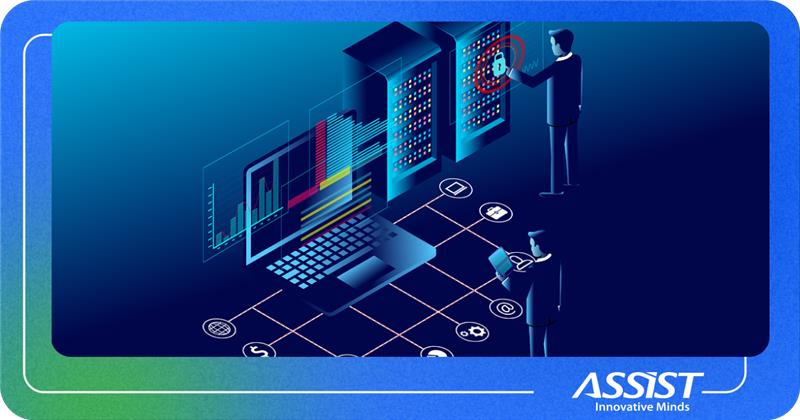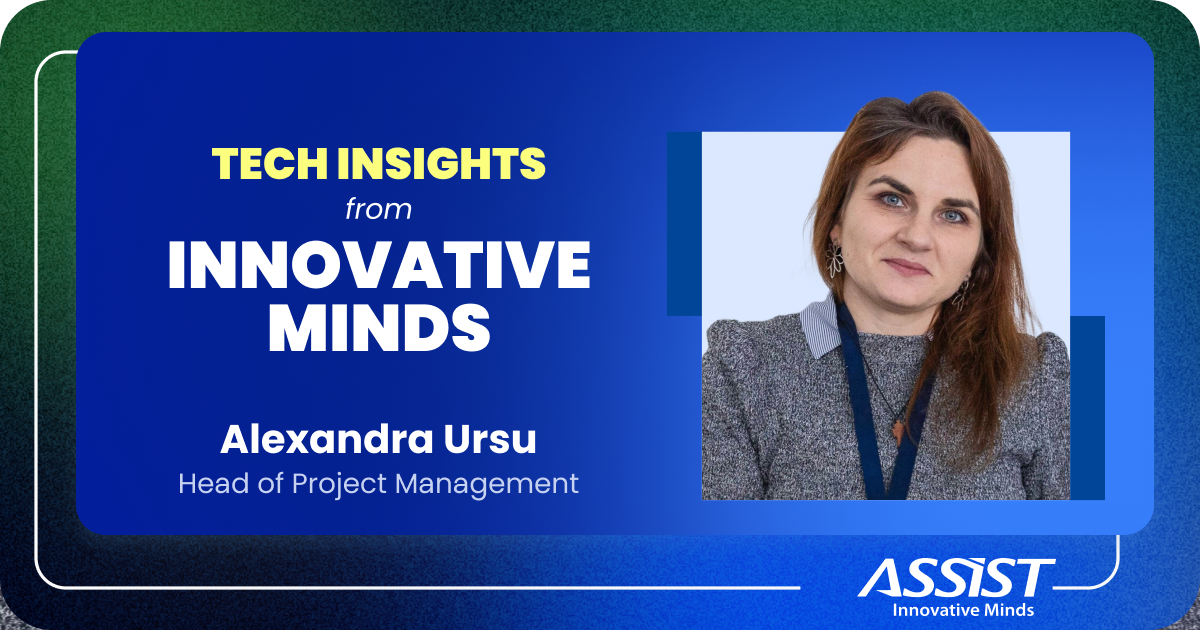Read time: 5 minutes
- Meet our Innovative Minds: Remus Baltariu
- The Role of Product Design in the Software Development Lifecycle
- Remus's insights on Product Design
- 1️⃣ How do you know your product has a "good design"?
- 2️⃣ How do you balance short-term design needs with long-term product vision?
- 3️⃣ How do you create harmony between client, user and design?
- 4️⃣ Do you use any AI tools in the design process?
- 5️⃣ Any tips for staying creative despite practical constraints?

Continuing our series that spotlights the innovative minds at ASSIST Software, we're excited to introduce another team member whose expertise drives our success. After featuring Maria Meheden in our first edition, we now turn our attention to Remus Baltariu, Head of Product Design. In this edition of Tech Insights from Innovative Minds, we delve into the role of Product Design in software development and how Remus ensures that our products stand out.
At the intersection between user experience and functionality, there is a team of creative and skilled designers led by Remus. With over a decade of experience in design, Remus's brilliant skill is that he can create products that deliver remarkable and distinctive features to clients and their users.
Meet our Innovative Minds: Remus Baltariu
 Remus's career in Product Design started with a desire to bring creativity to problem-solving. Over the years, his expertise has evolved into a deep understanding of creating intuitive, user-centered products that seamlessly integrate into the software development industry. These skills helped the Product Design department at ASSIST Software to push the boundaries of what's possible in terms of user experience.
Remus's career in Product Design started with a desire to bring creativity to problem-solving. Over the years, his expertise has evolved into a deep understanding of creating intuitive, user-centered products that seamlessly integrate into the software development industry. These skills helped the Product Design department at ASSIST Software to push the boundaries of what's possible in terms of user experience.
His work goes beyond merely making products "look good"—it's about imagining and creating designs that are functional, efficient, and accessible. For Remus, great design combines aesthetics and utility, assuring users can navigate products intuitively while enjoying a visually pleasing experience. This approach is essential in the software market, where the user's experience often determines the success of a product.
The Role of Product Design in the Software Development Lifecycle
Product Design is sometimes underestimated in the software development process, yet it is vital in shaping the success of any project. It serves as the bridge that links the technical capabilities of software development with the practical requirements of the users. This ASSIST Software department views design as a strategic tool that impacts every stage of development, from ideation and prototyping to final deployment.
As technology continues to develop, the role of Product Design in projects also evolves. Remus sees exciting opportunities in adopting emerging technologies such as artificial intelligence to create more adaptive and personalized user experiences. However, he also remains focused on the fundamentals: understanding human behavior and ensuring that technology serves its users in the best possible way.
Remus's insights on Product Design
1️⃣ How do you know your product has a "good design"?
Generally, when people hear about design, they often think only of the visual aspects. While visuals contribute significantly to a product's success, they represent just the tip of the iceberg. To create a truly exceptional product with good design, a strong foundation is essential, built upon user research, functional usability, and a clear understanding of the target audience.
This foundation encompasses problem-solving and empathy for user needs, ensuring that the product not only looks pleasing but also provides a satisfying and intuitive user experience. Ultimately, a good design integrates aesthetics with functionality, driving both user satisfaction and business success.
2️⃣ How do you balance short-term design needs with long-term product vision?
Establishing a clear product vision is essential for ensuring that everyone is aligned and shares the same understanding. While this may sound straightforward, the reality is often more complex. A well-defined vision acts as a north star for day-to-day decisions, and when paired with a comprehensive roadmap, it creates a guiding framework that fosters alignment and purpose across the team.
Additionally, adopting an iterative design approach helps us to continuously add value to the client's business. This process allows ongoing feedback gathering and enables us to test new directions, validating concepts before fully committing to them. By maintaining this balance between short-term design needs and long-term product vision, we can meet both short-term user expectations and long-term organizational goals.
3️⃣ How do you create harmony between client, user and design?
First and foremost, achieving a deep understanding of both user needs and business objectives is essential. One of the key responsibilities of designers is to balance various needs—whether they are business or user-related—along with constraints, such as technological limitations and stakeholder expectations.
Another critical element is alignment, which is fostered through collaboration among cross-functional teams and effective communication. This collaboration results in various artifacts that help us identify where and how user needs intersect with client objectives. In cases where these needs do not align, we assist our clients in building the right product and obtaining validation rather than merely ensuring that the product is built correctly, ultimately bringing the value of design and creating a meaningful product.
4️⃣ Do you use any AI tools in the design process?
One of my core traits is curiosity. And yes, I've always been curious to try new tools, including the ones using AI in one form or another. And what tool doesn’t include AI in one way or another nowadays? Jokes aside, I really like to see how different products have their take on the same topic. A few of the tools I use are the usual suspects: ChatGPT, Perplexity, Claude, generative AI tools from the Adobe Suite of tools, and Firefly. Other tools that I use but less often are Relume and Visual Electric, among others.
5️⃣ Any tips for staying creative despite practical constraints?
That's when creativity shines: when faced with constraints. This is because our minds always want to find new perspectives and views on the same challenges. The beauty of working in a collaborative way is that ideas spark and quickly build on one another. In summary, engage in collaborative sessions with individuals from diverse backgrounds to explore new possibilities.
As part of the Product Design team, Remus has been indispensable in positioning ASSIST Software as a leader in user-centered software development. His blend of technical expertise, creative vision, and collaborative spirit ensures that our products continue to exceed expectations.
Stay tuned for next month's edition of Tech Insights from Innovative Minds, where we will spotlight another talented team member from ASSIST Software.
- Read the previous edition of Tech Insights from Innovative Minds featuring Maria Meheden, our Deputy of Microsoft Technologies!






